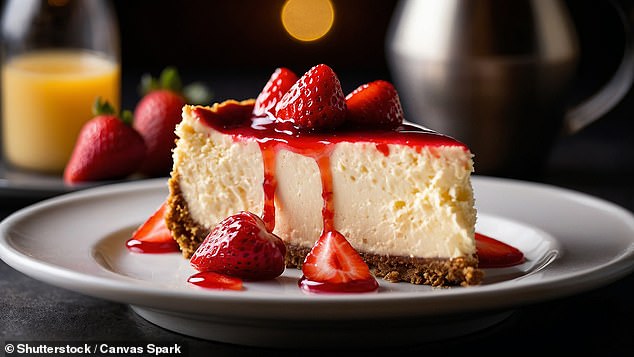Even after eating a huge meal, when barely able to move, many people can find ‘room for dessert’.
Now scientists may have found the reason why it is so hard to resist a sweet pudding.
A process in the brain, which makes us feel full after eating, also makes us hungry for sugar, a study suggests.
Mice who ate until they were full could barely manage another bite when offered seconds of their main meal.
But they ate six times as many calories when offered a sugary treat instead, and their brain lit up in an area called the paraventricular thalamus.
People given a sugary drink displayed the same brain activity, involving a group of brain cells called POMC neurons.
Further experiments in mice showed ‘turning off’ the important activity in the brain meant they no longer overate sugar when they were full up.
Dr Henning Fenselau, senior author of the study from Max Planck Institute for Metabolism Research, said: ‘Like many people, I find it difficult to say no if there is a very chocolatey and sweet dessert available.

Even after eating a huge meal, when barely able to move, many people can find ‘room for dessert’. Now scientists may have found the reason why it is so hard to resist a sweet pudding
‘It can be very hard to resist and, from an evolutionary perspective, that makes sense as sugar provides rapid energy and is hard to find in nature so our caveman brains are programmed to get it when we can.’
Mice were given their usual pellets of food, containing only three per cent sugar, to fill up on over 90 minutes.
Then they were offered either more of the same, or some delicious sweet pellets, which were 35 per cent sugar.
Not only did mice eat far more of their ‘dessert’ but at the same time their POMC neurons released feel-good endorphins picked up by other brain cells.
That made the sugar extra rewarding to eat, researchers suggest.
Even looking at a high-sugar pellet prompted this brain activity – in much the way looking at a friend’s dessert can make you suddenly feel hungry.
Mice appeared to get a rewarding feeling about pudding before even seeing it – similarly to the temptation of being shown a dessert menu.
When they sniffed a fruity fragrance which they had smelled while licking sugar water, the same brain activity was seen.

A process in the brain, which makes us feel full after eating, also makes us hungry for sugar, a study suggests (stock image)
The brain pathway was also identified in 30 people who were given a sugary drink while in an MRI scanner.
Like the mice, these people’s brain activity suggested the brain cells in the paraventricular thalamus (PVT) receiving endorphins from the POMC neurons were ‘turning off’ in order to reduce negative feelings towards the sweet treat – like the feeling that they were too full to want it.
However, this brain activity can be stopped, based on the experiments with mice.
When the feel-good endorphins produced by the POMC neurons were blocked from sending their signal to other cells, the mice didn’t overeat sugar.
A drug called naltrexone-bupropion, which has this effect in people, already leads to weight loss, which could be explained by the research.
But there could be better drugs in the future, which precisely target the specific small brain region involved in post-meal sugar cravings, and so avoid side-effects caused by other impacts on the brain.
The POMC neurons looked at in the study were previously known to create feelings of fullness.
Researchers established they make mice want to eat more of something because the animals consumed more sugar-free cherry and lemon-flavoured pellets when the neurons were activated with beams of light.
But, without scientists manipulating them, the neurons only appear to increase our appetite for sugar.
This is clear because how much mice ate delicious high-fat pellets after a meal was hardly influenced by whether their POMC neurons were active or not.
Next , the researchers plan to track people’s brain activity when given dessert after a main meal.
The same brain cells could even play a part in snacking, as they kicked in when mice who had not eaten for a few hours were given a sugary tidbit.
On the conclusions, published in the journal Science, Dr Fenselau said: ‘The appeal of sweet foods is part of the reason for binge-eating and obesity, so it is important to understand this better.’
This article was originally published by a www.dailymail.co.uk . Read the Original article here. .


